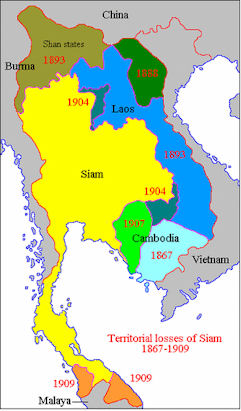

Zitierweise / cite as:
Payer, Alois <1944 - >: Chronik Thailands = กาลานุกรมสยามประเทศไทย. -- Chronik 2003 / B. E. 2546. -- 3. Juli bis Dezember. -- Fassung vom 2017-03-20. -- URL: http://www.payer.de/thailandchronik/chronik2003c.htm
Erstmals publiziert: 2012-11-01
Überarbeitungen: 2017-03-20 [Ergänzungen] ; 2016-12-31 [Ergänzungen] ; 2016-11-09 [Ergänzungen] ; 2016-02-12 [Ergänzungen] ; 2015-06-07 [Ergänzungen] ; 2015-04-15 [Ergänzungen]; 2014-11-01 [Ergänzungen]; 2013-10-15 [Ergänzungen]; 2013-04-25 [Teilung des Jahrgangs]; 2013-04-21 [Ergänzungen]; 2013-04-07 [Ergänzungen]; 2013-03-21 [Ergänzungen]; 2013-03-09 [Ergänzungen]; 2013-03-05 [Ergänzungen]; 2013-02-12 [Ergänzungen]; 2013-01-13 [Ergänzungen]; 2012-11-13 [Ergänzungen]
©opyright: Dieser Text steht der Allgemeinheit zur Verfügung. Eine Verwertung in Publikationen, die über übliche Zitate hinausgeht, bedarf der ausdrücklichen Genehmigung des Herausgebers.
Dieser Text ist Teil der Abteilung
Thailand von
Tüpfli's Global Village Library
ช้างตายทั้งตัวเอาใบบัวปิดไม่มิด
|
Gewidmet meiner lieben Frau Margarete Payer die seit unserem ersten Besuch in Thailand 1974 mit mir die Liebe zu den und die Sorge um die Bewohner Thailands teilt. |
|
Bei thailändischen Statistiken muss man mit allen Fehlerquellen rechnen, die in folgendem Werk beschrieben sind:
Die Statistikdiagramme geben also meistens eher qualitative als korrekte quantitative Beziehungen wieder.
|
2003-07-04
Senator Rabiabrat Pongpanich versucht die Veröffentlichung der Memoiren einer der Mätressen des ehemaligen Ministerpräsidenten Chatichai Choonhavan (ชาติชาย ชุณหะวัณ, 1920 — 1998) zu verhindern, welche als Fortsetzung in einer Zeitung erscheinen. Diese Memoiren könnten den Eindruck vermitteln, dass es akzeptabel sei, eine Geliebte zu haben. Der Sohn von Chatichais legaler Ehefrau begrüßt die Veröffentlichung, da seine Mutter lange genug unter den Liebschaften seines Vaters gelitten habe.
Abb.: Chatichai Choonhavan (ชาติชาย ชุณหะวัณ)
[Bildquelle: th.Wikipedia. -- Fair use]
2003-07-04
Premiere des Films Kon Barb Phrompiram (คนบาป พรหมพิราม, The Macabre Case of Prom Pi Ram) von Manop Udomdej (มานพ อุดมเดช). Der Film basiert auf einer wahren Begebenheit vor 26 Jahren: Vergewaltigung und Mord durch eine Gruppe. Die Bewohner des Dorfes Prom Pi Ram (พรหมพิราม) bitten die Regierung, dass der Name des Ortes aus dem Filmtitel gelöscht wird.
Abb.: Lage von Prom Pi Ram (พรหมพิราม)
[Bildquelle: OpenStreetMap. -- Creative Commons Lizenz (Namensnennung, share alike)]
Abb.: Plakat
[Bildquelle: th.Wikipedia. -- Fair use]
2003-07-05 - 2003-07-13
2003 FIVB Boys Youth Volleyball World Championship in Suphanburi (สุพรรณบุรี). In der Gesamtwertung gewinnt Thailand den 6. Platz.
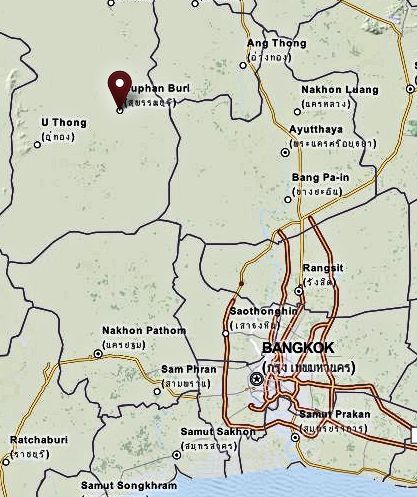
Abb.: Lage
von Suphanburi (สุพรรณบุรี)
[Bildquelle: OpenStreetMap. --
Creative
Commons Lizenz (Namensnennung, share alike)]
2003-07-14
Die Bewohner von Mahakan Fort (ป้อมมหากาฬ) in Bangkok sammeln bei einer buddhistischen Verdienst-Zeremonie 70.000 Baht, um einige alte Teak-Pfahlhäuser zu erhalten. Die Regierung hatte vor, diese abzureißen, um einem Park Platz zu machen. Bei der Konservierung der Häuser beraten Bangkoker Universitäten.
Abb.: Lage von Mahakan Fort (ป้อมมหากาฬ)
[Bildquelle: OpenStreetMap. -- Creative Commons Lizenz (Namensnennung, share alike)]
Abb.: Teak-Häuser bei Mahakan Fort (ป้อมมหากาฬ), 2006
[Bildquelle: Nina. -- http://www.flickr.com/photos/msnina/225061866/. -- Zugriff am 2012-01-01. -- Creative Commons Lizenz (Namensnennung, keine kommerzielle Nutzung, share alike)]
"The Pom (fort) Mahakan community is a small community of approximately 300 people residing next to Mahakan Fort, between the old city wall and the canal in central Bangkok. In January 2003, the residents were served with an eviction notice by the Bangkok Metropolitan Administration (BMA), and were offered relocation
to a place 45 kilometres away, on the outskirts of Bangkok. Thus began a long battle by the residents to retain their rights to the land.Some residents chose to move away but a core group of about 150 have remained, along with their teak houses which are examples of early Rattakosin-era architecture."
[Quelle: Nina. -- http://www.flickr.com/photos/msnina/225061866/. -- Zugriff am 2012-01-01. -- Creative Commons Lizenz (Namensnennung, keine kommerzielle Nutzung, share alike)]
2003-07-15
Die Behörden bemühen sich, das seit zwei Monaten geltende Verbot von Ragnarok Online (라그나로크 온라인, แร็กนาร็อกออนไลน์) durchzusetzen. Mehr als 600.000 Thais spielen mit, viele Jugendliche kommen dadurch kaum zum Schlafen. Man versucht, das Spiel im Internet von 22:00 bis 6:00 zu blockieren. Universitätsstudenten und Erwachsene, die nachts zu spielen pflegen, sind wütend und verlangen, dass die Regierung ihre Maßnahme zurückzieht.
Abb.: ®Logo
[Bildquelle: Wikipedia]
"Ragnarok Online (abgekürzt RO) ist ein Massively Multiplayer Online Role-Playing Game (MMORPG), welches ursprünglich von Lead-Designer Kim Hakkyu, arbeitend für die Gravity Corp. mit Sitz in Südkorea entwickelt wurde. Aufgrund von Streitigkeiten zwischen ihm und dem späteren Hauptfinanzier Samsung verließ er jedoch Gravity, einschließlich eines Großteils des Entwicklerteams und entwickelt derzeit das MMOG Granado Espada. Gravity Corp. selbst befindet sich mittlerweile nach der Beendigung des Vertrags mit Samsung zum Großteil in der Hand der SoftBank Group, welche gleichzeitig auch Mutterkonzern für Gung-Ho, dem Betreiber der japanischen RO Version, ist. Stil [Bearbeiten]
Der Hintergrund des Spiels basiert auf dem Manhwa „Ragnarök“ von Lee Myung-Jin. Um dieser Vorlage gerecht zu werden, hat man sich für einen ungewöhnlichen Grafikstil entschieden. Während die Umgebung in 3D dargestellt wird, werden Spielfiguren und Gegner durch zweidimensionale Sprites dargestellt.
Durch diesen nostalgischen, an alte Konsolenspiele erinnernden, Charakterstil in Kombination mit einer zeitgemäßen 3D-Umgebung hat das Spiel eine Nische im ansonsten so überfüllten MMOG-Markt gefunden.
Spielprinzip [Bearbeiten]Das Hauptelement Ragnarok Onlines ist, wie bei den meisten Rollenspielen der Aufbau und die Ausrüstung der eigenen Spielfigur. Dies wird hauptsächlich durch den Kampf gegen Monster erreicht (üblicherweise als PvE bezeichnet). In speziellen Gebieten können auch die Spieler gegeneinander antreten (PvP). Des Weiteren können Spieler Gruppen (Partys) bilden, um gemeinsam zu spielen. Während die Gruppen in der Regel lose, kurzzeitige Zweckbündnisse sind, besteht auch die Möglichkeit, sich mit anderen Spielern zu festen Gilden zusammenzuschließen. In Gruppen zusammengeschlossen, können Spieler gegen stärkere Gegner, sogenannte Bosse, antreten oder Quests zu absolvieren. Dabei werden die Erfahrungspunkte, wenn es von der Gruppe gewünscht wird, aufgeteilt.
Zweimal pro Woche findet für jeweils zwei Stunden ein Gildenkrieg statt, der sogenannte War of Emperium (kurz: WoE), bei dem Gilden gegeneinander um Burgen Kämpfen. Ziel ist der Besitz möglichst vieler Burgen, die der jeweiligen Gilde gewisse Vorteile gewährt. In jeder Burg gibt es einen großen, goldenen Kristall, das namensgebende Emperium. Zur Eroberung muss eine etwaig vorhandene Verteidigung gebrochen und dieser Kristall zerstört werden. Die Gilde, der der letzte Schlag gelingt, wird dann neuer Besitzer der Burg. Die Gilden, die zu Ende des War of Emperium eine der Burgen besetzt halten, behalten diese bis zum nächsten War of Emperium. Durch die Burgen gelangen die besitzenden Gilden an Schatztruhen, die wertvolle Gegenstände enthalten können und erhalten zusätzlich Zugang zu einem der vier Guild Dungeons, Karten mit stärkeren Monstern, die mehr Erfahrungspunkte verleihen, in denen die Spieler aber auch von rivalisierenden Gildenmitgliedern angegriffen werden können (PvP). Viele Spieler, besonders diejenigen nahe der höchsten Stufe, sehen Erfolg im War of Emperium als das Hauptziel des Spiels und optimieren ihre Spielfiguren für diesen Zweck.
Im ersten Quartal 2008 wurde auf den europäischen Ragnarok-Online-Servern das War of Emperium: Second Edition (WoE:SE) eingeführt. Dies brachte 10 neue, deutlich größere und besser geschützte Burgen. Für diese Burgen existieren keine Guild Dungeons.
[...]
Vermarktung [Bearbeiten]Im Gegensatz zu vielen anderen MMOGs gibt es keine zentral betriebene und vermarktete Spielversion für die ganze Welt. Stattdessen gibt es mehrere, voneinander unabhängige, lokalisierte Versionen. Stattdessen werden Lizenzen an Franchise-Unternehmen in aller Welt verkauft, die jeweils eine von den anderen unabhängige Version mit zum Teil leichten inhaltlichen Unterschieden in einer bestimmten Region vermarkten. Von den lokalisierten Servern wird lediglich die koreanische Version vom Entwickler Gravity selbst betrieben. Die verschiedenen Server tragen Kürzel, bei denen ein oder zwei Kleinbuchstaben vor der Spielabkürzung RO (xxRO) indizieren, um welche Version es sich handelt.
Derzeitig gibt es folgende lokalisierte Versionen des Spiels für:
- Korea (kRO) (Hier erscheinen Updates zuerst, bis sie auf andere Spielwelten portiert werden)
- Japan (jRO)
- Thailand (tRO)
- VR China (cRO)
- Indonesien (idRO)
- Indien (inRO)
- Brasilien (bRO)
- Russland (rRO)
- Malaysia (mRO)
- Europa (euRO) wurde am 30. September 2010 um 24 Uhr geschlossen
- Philippinen (pRO)
- Taiwan/Hongkong (twRO)
- Vietnam (vRO)
- Frankreich (fRO) ist das neue euRo
- Vereinigte Arabische Emirate (aRO)
- eine internationale Version (iRO) für die USA und jegliche andere Länder mit oder ohne eigene Version
Alle diese Versionen - außer inRO, aRO und fRO, welche sich alleine durch kaufbare Gegenstände finanzieren - bieten die Zugangssoftware kostenlos an und finanzieren sich über monatliche Beiträge der Spieler. Die meisten Versionen bieten eine zwischen einer Woche und einem Monat lange kostenlose Probezeit an, nach deren Ablauf bezahlt werden muss, um weiterspielen zu können. Es bestehen Pauschalangebote für 1 Monat bis 1 Jahr und für Gelegenheitsspieler die Möglichkeit 30 Stunden Netto-Spielzeit zu kaufen, die nur angerechnet werden, wenn der Spieler online ist. Einige Versionen, wie zum Beispiel iRO, cRO und twRO, bieten mittlerweile auch kostenlose Server an, die allerdings auch einige Einschränkungen mit sich bringen. So kann man beispielsweise nicht von einer Stadt zu einer anderen teleportieren oder man verliert beim Tod ein 10faches der Erfahrungspunkte, die man normalerweise nicht verliert.
Das 'Maskottchen' des Spieles (Ein Monster namens Poring) ziert eine Reihe von Merchandising-Produkten und ist auch als Plüschtier erhältlich."
[Quelle: http://de.wikipedia.org/wiki/Ragnarok_Online. -- Zugriff am 2011-12-31]
2003-07-17
Um illegale Lotterien zu unterbinden, beginnt die Regierung mit dem Verkauf von Zwei- und Drei-Ziffern-Lottoscheinen. Ca. 35 Mio. Lose werden verkauft.
Abb.: Lottoschein für 3 und 2 Ziffern
2003-07-22
Der Sänger Apichet "Big" Kittikorncharoen (อภิเชษฐ์ "บิ๊ก" กิตติกรเจริญ, 1982 - 2007) der Gruppe D2B (ดีทูบี) hat einen Autounfall, bei dem er in einen der schmutzigen Khlongs Bangkoks fällt. Dadurch wird sein Gehirn infiziert und und liegt im Koma, aus dem er bis zu seinem Tod 2007 nicht mehr aufwachen wird.
Abb.: Apichet "Big" Kittikorncharoen (อภิเชษฐ์ กิตติกรเจริญ) (links) und D2B (ดีทูบี)
[Bildquelle: Sry85 / Wikipedia. -- GNU FDLicense]
"Apichet Kittikorncharoen (Thai: อภิเชษฐ์ กิตติกรเจริญ, name later changed to Panrawat (ปาณรวัฐ), 2 December 1982 – 9 December 2007) was a Thai singer known under the stage name Big D2B. He studied film at Bangkok University (มหาวิทยาลัยกรุงเทพ)) and was part of RS Promotion's trio boy band D2B (ดีทูบี). On 22 July 2003, a car accident in which he fell into a polluted Bangkok khlong (canal) resulted in severe brain infection with multiple organisms including the Pseudallescheria boydii fungus, which, despite efforts to treat him including four brain operations and medicine flown in from Australia, caused extensive damage to his brain. He remained in coma for four years before finally succumbing to the illness. Apichet's case, which saw throngs of fans hoping and praying for him at the hospital as well as intense media attention, helped raised awareness about the hazardous nature of Bangkok's water pollution."
[Quelle: http://en.wikipedia.org/wiki/Panrawat_Kittikorncharoen. -- Zugriff am 2012-01-901]
"D2B (Thai: ดีทูบี) was a Thai boy band from the Thai record label, RS promotion. The name "D2B" was created from the first letters of the members' nicknames, Dan, Big, and Beam, in which one name started with a "D" and 2 names started with a "B". "D2B" was one of the hottest boy bands in Thailand. However, on July 22, 2003, Big was in a major accident where his car flipped into a dirty roadside canal, leading to a bacterial infection in his brain. After being in a coma and persistent vegetative state for 4 years, he died on December 9, 2007. After Big had slipped into a coma, Dan and Beam continued their musical careers and released several duo albums. They went by the name "Dan-Beam." In 2005 Dan and Beam came out with their first album together called "Dan-Beam the album". Then in 2006 they came out with the second album " Dan-Beam the 2nd album Relax" and in 2007 they came out with their last album together "Dan-Beam the 3rd album Freedom". After Panrawat Kittikorncharoen (Big) died, Worawech Danuwong (Dan) left RS Promotion while Beam remained under them. However, in June 2010, RS suspended Beam and decided not to renew his contract.
The three members of the group were:
- Panrawat Kittikorncharoen (อภิเชษฐ์ กิตติกรเจริญ) (Big - บิ๊ก) - December 2, 1982 - December 9, 2007
- Worrawech Danuwong (วรเวช ดานุวงศ์) (Dan - แดน) - May 16, 1984
- Kawee Tanjararak (กวี ตันจรารักษ์) (Beam - บีม) - May 18, 1980"
[Quelle: http://en.wikipedia.org/wiki/D2B_%28group%29. -- Zugriff am 2012-01-01]
2003-07-27
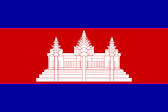
Bei den Parlamentswahlen in Kambodscha gewinnt die Cambodian People's Party (CPP, គណបក្សប្រជាជនកម្ពុជា) von Ministerpräsident Hun Sen (ហ៊ុន សែន) 47,3% der Stimmen.
"The Cambodian People's Party (Khmer: គណបក្សប្រជាជនកម្ពុជា, Kanakpak Pracheachon Kâmpuchéa) is the current ruling party of Cambodia. This party was formerly known as Kampuchean People's Revolutionary Party (KPRP, French acronym 'PRPK'). It was the sole legal party in the country at the time of the People's Republic of Kampuchea (PRK) 1981-1989 and the first two years of the State of Cambodia 1989-1991. Its name was changed during the transitional times of the State of Cambodia, when the single-party system, as well as the Marxist-Leninist ideology were abandoned.
The General Secretary of the party from 1979 to 5 December 1981 was Pen Sovan (ប៉ែន សុវណ្ណ). The KPRP was originally a Marxist-Leninist party, although it took on a more reformist outlook in the mid-1980s under Heng Samrin's (ហេង សំរិន) leadership.
Presently the party has an outright majority in the National Assembly of Cambodia, but governs in coalition with the royalist Funcinpec party (គណបក្ស ហ្វ៊ុនស៊ិនប៉ិច). The current (as of 2007) Prime Minister, Hun Sen (ហ៊ុន សែន), is the vice president of the party. The party adheres to a platform of Socialism.
History Forerunner organizationsThe original Kampuchean (or Khmer) People's Revolutionary Party (KPRP) was founded in French colonial times, in September 1951, when the Indochinese Communist Party (ICP, Đảng Cộng sản Đông Dương) ), founded by Ho Chi Minh in 1930, was dismembered into three national parties, the KPRP, the Vietnam Workers' Party (Đảng Cộng sản Việt Nam) and the Lao Itsala, prior to the independence of the three countries.
The name of the party was changed to the WPK in 1960 and then to the KCP in 1966. In one sense the KPRP was a new organization; in another sense it is the continuation of the parties that preceded it. The date of the KPRP founding is uncertain, although the First Party Congress held publicly was convened in May 1981; the party may have come into existence after mid-1978.
Constitution and early days Pen Sovan's leadership (1979 - 1981)A national committee led by Pen Sovan was appointed by the congress. The organization considered itself as the genuine inheritor of the original KPRP founded in 1951 (which had evolved into the CPK), and labelled the congress as the '3rd party congress' (thus not recognizing the 1963, 1975 and 1978 congresses of CPK as legitimate). The party considered June 28, 1951 as its founding date. The women's wing of the party, the National Association of Women for the Salvation of Kampuchea, was also established in 1979 with a vast national network of members that extended to the district level.
The existence of the party was kept secret until its 4th congress in May 1981, when it appeared publicly and assumed the name KPRP. The name-change was carried out 'to clearly distinguish it from the reactionary Pol Pot (ប៉ុល ពត) party and to underline and reassert the continuity of the party's best traditions'.
Very little is known about the Third Party Congress, also known as the Congress for Party Reconstruction, except that Pen Sovan was elected first secretary of the Central Committee and that the party had between sixty-two and sixty-six regular members.
Fourth Party Congress: Change of strategy (1981)In Pen Sovan's political report to the Fourth Party Congress held May 26 to May 29, 1981, he was careful to distance the KPRP from Pol Pot's CPK, and he denounced the CPK as a traitor to the party and to the nation.
The KPRP decided at the Fourth Party Congress to operate "openly." This move seemed to reflect the leadership's growing confidence in its ability to stay in power despite the ongoing guerrilla war with the Khmer Rouge (ខ្មែរក្រហម). The move may have had a practical dimension as well because it involved the people more actively in the regime's effort to build the country's political and administrative infrastructure.
The Fourth Party Congress reviewed Pen Sovan's political report and defined the party's strategy for the next several years. The Congress adopted five "basic principles of the party line," which were to uphold the banners of patriotism and of international proletarian solidarity; to defend the country (the primary and sacred task of all people); to restore and to develop the economy and the culture in the course of gradual transition toward socialism; to strengthen military solidarity with Vietnam, Laos, the Soviet Union, and other socialist nations; and to develop "a firm Marxist-Leninist party." At the Congress it was decided that henceforth the party would be known as the KPRP, in order to distinguish it from "the reactionary Pol Pot party and to underline and reassert the community of the party's best traditions." The Fourth Party Congress also proclaimed its resolve to stamp out the "reactionary ultra-nationalist doctrine of Pol Pot," to emphasize a centralized government and collective leadership, and to reject personality cults. The "ultra-nationalist doctrine" issue was an allusion to Pol Pot's racist, anti-Vietnamese stance. The Congress, attended by 162 delegates, elected twenty-one members of the party Central Committee, who in turn elected Pen Sovan as general secretary and the seven members of the party inner circle to the Political Bureau. It also adopted a new statute for the party, but did not release the text.
According to Michael Vickery, veterans of the independence struggle of the 1946 to 1954 period dominated the party Central Committee. A majority of the Central Committee members had spent all or part of the years 1954 to 1970 in exile in Vietnam or in the performance of "duties abroad."
Heng Samrin's leadershipThe KPRP's pro-Vietnamese position did not change when Heng Samrin suddenly replaced Pen Sovan as party leader on December 4, 1981. Pen Sovan, who was reportedly flown to Hanoi under Vietnamese guard, was "permitted to take a long rest," but observers believed that he was purged for not being sufficiently pro-Vietnamese. In any case, the new general secretary won Hanoi's endorsement by acknowledging Vietnam's role as senior partner in the Cambodian-Vietnamese relationship. The party recognized the change in leadership symbolically by changing the official founding date of the KPRP from February 19, 1951, to June 28, 1951, in deference to the Vietnam Workers' Party (Dang Lao Dong Viet Nam), which was established in March 1951.
In mid-1981, the KPRP was essentially a skeleton organization. It had few party branches except for those in Phnom Penh, in Kampong Saom, and in the eighteen provincial capitals. Party membership was estimated at between 600 and 1,000, a considerable increase over 1979 but still only a fraction of the number of cadres needed to run the party and the government. In 1981, several of the 18 provinces had only one party member each, and Kampong Cham (ខេត្តកំពង់ចាម), the largest province with a population of more than 1 million, had only 30 regular members, according to Cambodia specialist Ben Kiernan.
The party held its Fifth Party Congress from October 13 to October 16, 1985, to reflect on the previous five years and to chart a new course for the next several years. The party's membership had increased to 7,500 regulars (4,000 new members joined in 1985 alone). The party had an additional pool of 37,000 "core" members from which it could recruit tested party regulars. There were only 4,000 core members in mid-1981. According to General Secretary Heng Samrin's political report, the KPRP had twenty-two regional committees and an undisclosed number of branches, circles, and cells in government agencies, armed forces units, internal security organs, mass organizations, enterprises, factories, and farms. The report expressed satisfaction with party reconstruction since 1981, especially with the removal of the "danger of authoritarianism" and the restoration of the principles of democratic centralism and of collective leadership. It pointed out "some weaknesses" that had to be overcome, however. For example, the party was "still too thin and weak" at the district and the grass-roots levels. Ideological work lagged and lacked depth and consistency; party policies were implemented very slowly, if at all, with few, if any, timely steps to rectify failings; and party cadres, because of their propensities for narrow-mindedness, arrogance, and bureaucratism, were unable to win popular trust and support. Another major problem was the serious shortage of political cadres (for party chapters), economic and managerial cadres, and technical cadres. Still another problem that had to be addressed "in the years to come" was the lack of a documented history of the KPRP. Heng Samrin's political report stressed the importance of party history for understanding "the good traditions of the party."
The report to the Fifth Congress noted that Heng Samrin's administration, in coordination with "Vietnamese volunteers," had destroyed "all types" of resistance guerrilla bases. The report also struck a sobering note: the economy remained backward and unbalanced, with its material and technical bases still below pre-war levels, and the country's industries were languishing from lack of fuel, spare parts, and raw materials. Transition toward socialism, the report warned, would take "dozens of years."
To hasten the transition to socialism, the Fifth Congress unveiled the PRK's First Plan, covering the years 1986 to 1990. The program included the addition of the "private economy" to the three sectors of the economy mentioned in the Constitution (the state sector, collective sector, and the family sector). Including the private economy was necessary because of the "very heavy and very complex task" that lay ahead in order to transform the "nonsocialist components" of the economy to an advanced stage. According to the political report submitted to the congress, mass mobilization of the population was considered crucial to the successful outcome of the First Plan. The report also noted the need to cultivate "new socialist men" if Cambodia were to succeed in its nation-building. These men were supposed to be loyal to the fatherland and to socialism; to respect manual labor, production, public property, and discipline; and to possess "scientific knowledge."
Heng Samrin's political report also focused on foreign affairs. He recommended that Phnom Penh strengthen its policy of alliance with Vietnam, Laos, the Soviet Union, and other socialist countries. He stressed—as Pen Sovan had in May 1981—that such an alliance was, in effect, "a law" that guaranteed the success of the Cambodian revolution. At the same time, he urged the congress and the Cambodian people to spurn "narrow-minded chauvinism, every opportunistic tendency, and every act and attitude infringing on the friendship" between Cambodia and its Indochinese neighbors. (He was apparently alluding to the continued Cambodian sensitivity to the presence of Vietnamese troops and of about 60,000 Vietnamese settlers in Cambodia. CGDK sources maintained that there were really about 700,000 Vietnamese settlers in the country.)
The KPRP's three objectives for the period 1986 to 1990 were to demonstrate military superiority "along the border and inside the country" for complete elimination of all anti-PRK activities; to develop political, military, and economic capabilities; and to strengthen special relations with Vietnam as well as mutual cooperation with other fraternal countries. Before Heng Samrin's closing address on October 16, the 250 party delegates to the congress elected a new Central Committee of 45 members (31 full members and 14 alternates). The Central Committee in turn elected Heng Samrin as general secretary, a new Political Bureau (nine full members and two alternates), a five-member Secretariat, and seven members of the Central Committee Control Commission.
After the Fifth Congress, the party's organizational work was intensified substantially. The KPRP claimed that by the end of 1986 it had more than 10,000 regular members and 40,000 candidate members who were being groomed for regular status.
Birth of the Cambodian People's Party' (1991)In 1991 the party was renamed Cambodian People's Party (CPP) during a UN-sponsored peace and reconciliation process.
Prime Minister Hun Sen has continued to lead the party to election victories after the transition to democracy. It won 64 of the 123 seats in the National Assembly in the 1998 elections, 73 seats in the 2003 elections, and 90 seats in the 2008 elections, winning the popular vote by the biggest margin ever for a National Assembly election with 58% of the vote. The CPP also won the 2006 Senate elections."
[Quelle: http://en.wikipedia.org/wiki/Cambodian_People%27s_Party. -- Zugriff am 2011-12-28]
2003-07-31
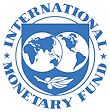
Thailand zahlt zwei Jahre vor Fälligkeit die restliche Rate des $14 Mio. Kredits des Internationalen Währungsfond (IMF) zurück. Den Kredit hatte Thailand 1997 während der Finanzkrise aufgenommen. Die Regierung sieht Thailand nun befreit von den Fesseln des IMF und will einige der Gesetze, die aufgrund der Bedingungen des IMF erlassen worden waren, revidieren.
2003-08-01
Premiere des Films One Night Husband (คืนไร้เงา) von Pimpaka Towira (พิมพกา โตวิระ)
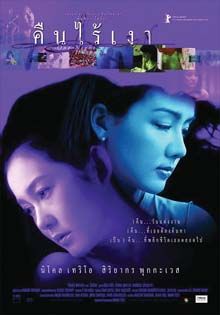
Abb.: Plakat
[Bildquelle: Wikipedia. -- Fair use]
|
"One Night Husband (Thai: คืนไร้เงา or Kuen rai ngao) is a 2003 Thai thriller film directed by Pimpaka Towira (พิมพกา โตวิระ) and co-written by Pimpaka and Prabda Yoon ´(ปราบดา หยุ่น, 1973 - ). It was the debut feature film for Pimpaka, an independent film director and one of the few female directors working in the Thai film industry. One Night Husband was also the film debut of Thai-Canadian pop singer Nicole Theriault (นิโคล เทริโอ, 1973 - ). PlotOn her first night with her husband, newlywed Sipang's husband Napat takes a mysterious phone call and then leaves. When he doesn't return, Sipang asks her new brother-in-law, Chatchai, to help. Joining Sipang in her search is Chatchai's timid wife Busaba. As the search for Napat drags on, Sipang uncovers some disturbing things about her husband's past. Cast
One Night Husband premiered at the Berlin Film Festival in 2003 and was screened at several other film festivals in 2003, including the Deauville Asian Film Festival, Hong Kong International Film Festival (香港國際電影節) , Singapore International Film Festival, CINEFAN Film Festival, Fukuoka Asian Film Festival (福岡アジア映画祭), Pusan International Film Festival (부산국제영화제) and the Stockholm International Film Festival." [Quelle: http://en.wikipedia.org/wiki/One_Night_Husband. -- Zugriff am 2013-03-20] |
2003-08-05

Ein Bombenanschlag der Jemaah Islamyah (JI) tötet in Jakarta (Indonesien) 14 Menschen und verletzt 149. Hinter dem Anschlag steckt Riduan Isamuddin aka Hambali (geb. 1964)
Abb.: Lage von Jakarta (Indonesien)
[Bildquelle: OpenStreetMap. -- Creative Commons Lizenz (Namensnennung, share alike)]
2003-08-06
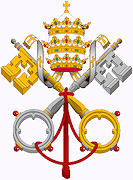

Tod des katholischen US-Priesters Ray Brennan C.Ss.R. (Redemptorist) (1932 - 2003)
"A year before his ordination Ray was informed that he would be sent to Thailand, an idea that did not appeal to him. His mother though, did not seem surprised. She said that of her three children, Ray was the only one who liked eating rice! As the newly ordained Father Ray Brennan arrived in the Kingdom of Thailand, his first posting was to Sri Racha [ศรีราชา], a small fishing village about a two hour drive from Bangkok on the Gulf of Thailand. He remained there for 6 months studying the Thai language.
His next assignment was to Isaan [อีสาน], the vast, flat northeastern part of the country along with the newly independent country of Laos. Having mastered the Lao dialect, he was given a parish in a village in Loei [เลย], a mountainous and sparsely populated province.
After 10 years in Thailand’s northeast, Father Ray was assigned to the seaside fishing village of Pattaya [พัทยา], which was growing in size due to its popularity as a ‘Rest & Relaxation’ destination for U.S. soldiers fighting in the Vietnam War.
In 1969 Father Ray replaced Father Godbout who had been the pastor of St. Nikolaus Church [วัดคาทอลิกนักบุญนิโคลัส] for two years. After one year in Pattaya something happened that would change the course of Father Ray’s life forever.
One day, at the end of a Sunday service, a woman approached him with a baby in her arms. She told him that the father of the baby, her former husband, had run away, and she had since found a new husband. However, as is common in many cases, her new husband would have nothing to do with the child. Father Ray said that he would take the child, even though he did not have any experience taking car of a child. When Father Ray accepted the child he was not aware of how many lives this one action was going to change.
During the Vietnam War many children were born to Thai mothers and American fathers. These children were not accepted by society; many did not want a half white or a half black child in their families, but Father Ray accepted these unwanted children and gave them a home.
Word soon traveled around town about the work Father Ray was doing, and more children arrived. Poor Thais arrived and asked this American priest to take care of their child, as they were too poor to provide what the child needed.
The first child arrived in 1974, and for the next twenty nine years Father Ray worked tirelessly to provide a home for the homeless and an education for the uneducated.
He became ‘father’ to hundreds or orphaned babies, neglected children and abused teenagers. He became a hero to many people living with a disability; he gave them an education, and the confidence to hold their heads high and be equals in society.
On the 16th August 2003 Father Ray died.
His body lay for three days in the auditorium of the Pattaya Orphanage [มูลนิธิสงเคราะห์เด็ก], and at night his children slept on the floor next to his coffin so that he was no alone.
Father Ray’s funeral was the biggest Pattaya has ever seen. His family flew from the United States to attend, and they joined thousands of his children and students, past and present, young and old, as well as friends and supporters who all came to say a last farewell to a great man.
His Majesty the King of Thailand sent representatives who presented a small case containing royal soil which was to be buried with Father Ray, the highest honor a person can receive."
[Quelle: http://www.fr-ray.org/en/about-us/who-was-father-ray/. -- Zugriff am 2015-04-09]
"The surrounding Buddhist community proved a prime supporter, along with the American military, although not always through official channels. "You know that this office we’re sitting in is stolen property, " he told a visitor, recounting how one sergeant thought Father Brennan needed a trailer more than the U. S. Army. When Pattaya [พัทยา] became a favorite port-of- call, seamen would drop by to hand Brennan everything from telephones to garbage cans "borrowed" from their ships. Other frequent visitors were Pattaya's numerous prostitutes, asking him to translate letters and cash checks from their foreign boyfriends. Some received money from more than one man, but the priest kept their secrets and cashed their checks. And the girls would usually leave a few dollars for Father Brennan’s kids." [Quelel: Americans in Thailand / ed. by Nicholas Grossman. -- Singapore : Didier Millet, 2015. -- 304 S. : Ill. ; 25 cm. -- ISBN 978-981-4385-84-8. -- S. 2131]
2003-08-08
Premiere des Films Last Life in the Universe (เรื่องรัก น้อยนิด มหาศาล) von Pen-Ek Ratanaruang (เป็นเอก รัตนเรือง, 1962 - )
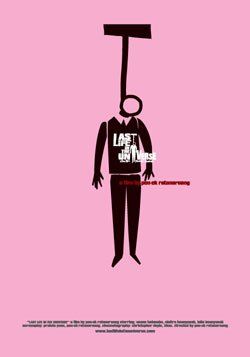
Abb.: Plakat
[Bildquelle: th.Wikipedia. -- Fair use]
|
"Last Life in the Universe (Thai title: เรื่องรัก น้อยนิด มหาศาล, Ruang rak noi nid mahasan) is a 2003 Thai film directed by Pen-Ek Ratanaruang (เป็นเอก รัตนเรือง, 1962 - ). The film is notable for being trilingual; the two main characters flit from Thai to Japanese to English as their vocabulary requires. The film stars Japanese actor Tadanobu Asano (浅野 忠信, 1973 - ) and Sinitta Boonyasak (สินิทรา บุญยศักดิ์, 1979 - ). PlotKenji (เคนจิ) is a lonely librarian in the Japan Foundation (国際交流基金) in Bangkok. Living in an apartment full of precise stacks of books, his half-hearted attempts to kill himself are continually interrupted by the people around him. Kenji's most notable obstacle is his self-absorbed brother, Yukio, a yakuza (ヤクザ), or Japanese gangster. Yukio fled from Japan to escape the wrath of his employer, with whose daughter he had had sex.[1] Yukio's friend Takashi suggests that if it were his daughter, he would have the despoiler killed, but Kenji's brother laughs this warning off. Yukio frequents a club where he can enjoy the attention of a bunny-eared hostess, a local girl named Nid (นิด). Nid's sister, Noi (น้อย), is furious at her sibling for having slept with her boyfriend, Jon. One day in the library, Kenji spies on Nid, clad in a school girl's uniform. Soon after, he discovers that his brother has hidden a pistol inside a teddy bear. He is about to shoot himself when Yukio is slain by Takashi, who was apparently hired by Yukio's employer. (During the library scene where Kenji first encounters Nid, a hanging poster for the Takashi Miike (三池 崇史, 1960 - ) film Ichi the Killer ((殺し屋1) is clearly featured. Tandanobu Asano was also the star of that film.) Takashi sees Kenji, who appears hopeful at his impending death, but suddenly Kenji shoots and kills the assassin. Not long after that, Kenji is about to jump off a bridge when Noi and Nid, driving past, have an argument. Noi throws Nid out of the car, then reconsiders. Nid, distracted by Kenji sitting on the railing of the bridge, is struck by another car and dies. Kenji and Noi, both having lost a sibling, form a tentative friendship. The introspective Kenji asks the extroverted Noi if he can stay with her, unwilling to spend time with the two corpses in his apartment. Noi agrees, and invites the fussy Japanese man into her disastrously unkempt beachside home. As Kenji begins cleaning, Noi prepares to leave for Japan to further her career. Surreal elements creep into the film; Noi sees the house magically cleaning itself, while Kenji watches Noi transform into her temptress sister. The couple, in some ways polar opposites and in some ways mirror images, form a semi-romantic relationship. Meanwhile, the abusive and promiscuous ex-boyfriend Jon begins calling, angry that Noi thinks she can leave him. Three yakuza are also dispatched to find out what has happened to Takashi. In the final segments, Kenji drives Noi to the airport, then decides he will join her. He returns to his apartment to gather his things and purposely knocks over a stack of books. While he is in the bathroom, first Jon, then the yakuza arrive. Jon is slain, and Kenji apparently escapes out the window. The movie then cuts back and forth between two scenes: one, in which Kenji has been arrested for some unspecified crime, and another in which he is re-united with Noi in Japan. The relationship between or canonicity of these two scenes is not made clear by the movie - particularly whether the reuniting scene is imagined or not. Throughout the movie are images of the furtive gecko who lives in Noi's house, as well as The Last Lizard, Kenji's children's book about a reptile who wakes up to discover he is the final member of his species. The fictional lizard realizes that even being with his enemies, the other lizards who picked on him, was preferable to being alone. AwardsLast Life in the Universe was awarded in Thailand two times by the Thailand National Film Association Awards (รางวัลภาพยนตร์แห่งชาติ สุพรรณหงส์) and the FIPRESCI Prize (Bangkok International Film Festival - ทศกาลภาพยนตร์นานาชาติกรุงเทพฯ). For his role as Kenji, Tadanobu Asano received the Upstream Prize for Best Actor at the 2003 Venice Film Festival. The film received the AQCC Award and Jury Prize at the Fant-Asia Film Festival. It was also chosen to be Thailand's official submission for the Academy Award for Best Foreign Language Film in 2003. The soundtrack music played at the end of the movie called "Gravity", performed by the Thai diva Dharini Divari (ธาริณี ทิวารี), became a hit. Cast
[Quelle: http://en.wikipedia.org/wiki/Last_Life_in_the_Universe. -- Zugriff am 2013-03-20] |
2003-08-11
Das Verkehrsministerium versteigert glücksbringende (มงคล) Autokennzeichen (ทะเบียนรถ). Insgesamt werden glücksbringende Nummernschilder für 28,8 Mio. Baht versteigert. Transportminister Suriya Jungrungreankit zahlt 4 Millionen Baht für das Autokennzeichen 9999. Er sagt, das sei eine bessere Investition als in Aktien, da er das Schild für 4,5 Mio. Baht verkaufen könnte.
Abb.: Glücksbringendes Autokennzeichen der Provinz Ratchaburi (ราชบุรี)
[Bildquelle: http://driving.information.in.th/license-plates.html. -- Zugriff am 2012-01-01. -- Fair use]
2003-08-11


Thailändische Polizisten und FBI-Agenten verhaften in Ayutthaya (อยุธยา) den indonesischen Terroristen Riduan Isamuddin aka Hambali (geb. 1964).
Abb.: Lage von Ayutthaya (อยุธยา)
[Bildquelle: OpenStreetMap. -- Creative Commons Lizenz (Namensnennung, share alike)]
"Riduan Isamuddin also transliterated as Riduan Isamudin, Riduan Isomuddin, and Riduan Isomudin, better known by the nom de guerre Hambali, born as Encep Nurjaman, born April 4, 1964[1] (Indonesia) is the former military leader of the Indonesian terrorist organization Jemaah Islamiyah (JI), which is linked with Al Qaeda. He is now in extrajudicial detention in the United States's Guantanamo Bay detainment camps, in Cuba.[2] Hambali was often described as "the Osama bin Laden of Southeast Asia". Some media reports describe him as Bin Laden's lieutenant for Southeast Asian operations. Other reports describe him as an independent peer. He was highly trusted by Al Qaeda and was the main link between the two organisations. Hambali was a close friend of Khalid Shaikh Mohammed (خالد شيخ محمد), who planned Operation Bojinka (بجنكة) and the September 11 Terrorist Attacks. Hambali envisioned creating a Muslim state, in the form of an Islamic superpower (a theocracy) across Southeast Asia, with himself as its leader (Caliph - خليفة). His ambition was to rule Indonesia, Malaysia, Singapore, Brunei, Cambodia, and parts of the Philippines, Myanmar, and Thailand.
Receiving increasing attention in the aftermath of the 2002 Bali nightclub bombing, in which 202 people died. According to the Office of the Director of National Intelligence he served as the third in command of Al Qaeda, from the 2003 capture of Khalid Sheikh Mohammed to his own capture in 2005. He was eventually apprehended in a joint operation by the CIA and Thai police. He is currently imprisoned in Guantanamo Bay detention center in Cuba, after three years of CIA custody in a secret location.
[...]
CaptureHambali used a series of safe-houses throughout Southeast Asia, especially Thailand and Cambodia, to move around. While he was in Ayutthaya (อยุธยา), Thailand, 75 kilometers north of Bangkok, he was planning a terrorist attack against several Thai hotels and the Asia Pacific Economic Cooperation summit (APEC) in Bangkok on October 2003. Hambali had used a false Spanish passport to enter Thailand while his wife used her Malaysian passport.
Thai police found him as part of a joint operation between the Thai police and the CIA on August 11, 2003. The twenty uniformed and undercover police smashed down the door to his one bedroom apartment in Ayutthaya, and arrested him and 33-year old Noralwizah Lee Abdullah, a Chinese Malaysian who was considered to be his wife. Hambali was wearing a pair of jeans, a t-shirt, a baseball cap, and a pair of sunglasses. Police also seized explosives and firearms in the property. It marked the end of a 20-month hunt for Hambali, who was 37 years of age when he was captured."
[Quelle: http://en.wikipedia.org/wiki/Hambali. -- Zugriff am 2011-12-28]
2003-08-13
Gründung des The Halal Science Center (ศูนย์วิทยาศาสตร์ฮาลาล) an der Chulalongkorn University (จุฬาลงกรณ์มหาวิทยาลัย)
"The Halal Science Center (ศูนย์วิทยาศาสตร์ฮาลาล) is an instructional center and network of laboratories in Thailand dedicated to maintaining the standards of Halal (حلال) (ฮะลาล), an Arabic term which designates acceptable objects or actions in Islam and is frequently used in reference to allowed foods. It is the primary network dedicated to Halal science in Thailand and, according to the Malaysian Halal Journal, who gave it a Best Innovation in Halal Industry award in 2006, "the first dedicated Halal Science institution in the world."[1] Purpose
The Halal Science Center analyzes food for contaminants not compatible with the law of Islam and conducts research into new methods of food preparation and new reagents for detecting such contaminants. It also provides information and training to the public and to the food service industry related to the preparation of food in accordance with Islamic law, including offering a bachelor's degree in Nutrition and Dietetics.
HistoryThe Center began as the Central Laboratory and Scientific Information Center for Halal Food Development (Halal-CELSIC) at Chulalongkorn University (จุฬาลงกรณ์มหาวิทยาลัย) in Bangkok on August 13, 2003, under grant by the Cabinet of Thailand. Subsequently, Halal-CELSIC established laboratories in over ten other universities and institutions before reorganizing into the Halal Science Center.
In 2006, the organization received an award for Best Innovation in Halal Industry from Halal Journal. The award was presented by Abdullah Ahmad Badawi (1939 - ), Prime Minister of Malaysia, in Kuala Lumpur.[2][3]"
[Quelle: http://en.wikipedia.org/wiki/The_Halal_Science_Center. -- Zugriff am 2012-06-15]
2003-08-24
ไทยโพสต์ (Thai Post): ประเทศนี้ ไม่ มี “วัน ประชาธิปไตย” [There is no "Democracy Day" in this country] / von ชัยวัฒน์ สุรวิชัย [Chaiwat Surawichai]
"Chaturon [Chaturon Chaisang (จาตุรนต์ ฉายแสง, 1956 - )], Surapong [Surapong Suebwonglee (สุรพงษ์ สืบวงศ์ลี, 1957 -)], and Praphat [Praphat Panyachatirak (ประพัฒน์ ปัญญาชาติรักษ์, 1952 - )] are still good examples; they still carry on with their good intentions. But they do not have much chance. I am still proud of Ming [Prommin] [Prommin Lertsuridej (พรหมินทร์ เลิศสุริย์เดช, 1954 - )], Phumtham [Phumtham Wechayachai (ภูมิธรรม เวชยชัย, 1953 - )], and Saman [Saman Lertwongrat (สมาน เลิศวงศ์รัฐ, 1952 -)]. At least I do know that they will not be corrupt like old-style politicians. Although we sometimes have different attitudes about work, we have a sense of brotherhood. They will link themselves to the peoples movement. They listen to and try to understand the people. My suggestion to them is that they have to maintain their connection to those Octobrists [คนเดือนตุลา] who still pursue our good intentions and ideology." [Übersetzung: Kanokrat Lertchoosakul [กนกรัตน์ เลิศชูสกุล]: The rise of the Octobrists in contemporary Thailand : power and conflict among former left-wing student activists in Thai politics. -- New Haven : Yale University Southeast asia Studies, 2016. -- 364 S. 23 cm. -- (Yale Southeast Asia studies ; monograph 65). -- ISBN 9780985042943. -- Zugl. The London School of Economics and Political Science, thesis 2012-09. -- S. 220. -- Fair use]
2003-08-30
The Nation:
Abb.: Lage von Amphoe Phon Sai [โพนทราย]
[Bildquelle: OpenStreetMap. -- Creative Commons Lizenz (Namensnennung, share alike)]
"About 1, 000 residents yesterday threatened to turn a road in Phon Sai [โพนทราย] district into a rice farm after it was left in disrepair for 28 years. The 4. 5 kilometer stretch of the Hong Sang-Chado road, beginning at kilometer marker 28 in Nong Thum village, serves tambons Sam Kha [สามขา], Yang Kham [ยางคำ], and Tha Hat Yao [ท่าหาดยาว]. The residents yesterday brought ploughing machines, hoes, and rice shoots which they planted in craters in the road. The road has not been repaired despite complaints to the provincial authority and even cabinet members, said resident Narong Thonsi. The protest was an attempt to bring their grievance to the attention of the authorities, he said." [Zitiert in: Hjorleifur Jonsson: Mien relations : mountain people and state control in Thailand. -- Ithaca : Cornell, 2005. -- 198 S. : Ill ; 24 cm. -- ISBN 0801472849. -- S. 148]
2003-09
Die Bangkok Post berichtet über einen Versuch, die Kanäle Bangkoks vom größten Schmutz und Gestank zu befreien:
"Nach einem Artikel in der Bangkok Post vom September 2003 hat sich eine kleine Gruppe von Aktivisten, die am Khlong Saen Saeb (คลองแสนแสบ) in Bang Kapi (บางกะปิ) leben, eine Möglichkeit ausgedacht, die Kanäle Bangkoks vom größten Schmutz und Gestank zu befreien. Sie haben sich das sog. „Ionische Plasma Enzym“ (enzyme ionic plasma - EIP) ausgedacht, das u.a. aus Schalen von Zitrusfrüchten, Gemüseabfällen und Sirup besteht, die etwa 15 Tage lang fermentiert werden. Diese Mixtur enthält natürliche Mikro-Organismen, die angeblich die Fähigkeit verbessern, organische Abfälle im Wasser der Khlongs (คลอง) schneller zu zersetzen. Gleichzeitig sollen die Zitrusfrüchte den Geruch verbessern. Befürworter des EIP-Systems behaupteten, es sei sehr effektiv: sie haben am 13. August 2003 etwa 13.000 Liter flüssiges EIP an fünf Stellen in den Khlong Saen Saeb geschüttet, Asst. Prof. Taeng-On sagte: „Der faulige Gestank des Saen Saeb Kanals war innerhalb einer Stunde verschwunden. Am nächsten Morgen war das Wasser sauber. Aber da immer wieder Abwasser eingeleitet wurde, war das Wasser des Kanals kurz darauf wieder schwarz.“ Das EIP solle nun in Flaschen abgefüllt werden und an Haushalte entlang des Khlongs verteilt werden, die damit z. B. das Spülwasser der Toiletten versetzen, bevor es in den Kanal abgeführt wird." [Quelle: http://de.wikipedia.org/wiki/Khlong_Saen_Saeb. -- Zugriff am 2012-06-19]
2003-09-02
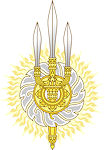
"Thaksin tried to appease others in the military by allowing them to purchase arms. At a meeting of all the military leaders on September 2, 2003, Thaksin agreed to increase the military procurement budget from 17 billion baht to 20 billion baht to buy arms and develop the military for the period 2005—13. He approved the army’s plan to buy 33 Black Hawk helicopters, valued at 750 million baht; and supported the air force proposal to upgrade its F16 and F5 fighters. When he took leaders of the army, navy and the air force to Russia in order to shop for arms and satellite projects, he cited the King’s words, His Majesty the King has said that the army had been short of budget for many years. But the soldiers must have potential and be ready for combat all the time."
[Quelle: Ukrist Pathmanand [อุกฤษฏ์ ปัทมานันท์]. -- In: Unequal Thailand : aspects of income, wealth and power / ed. by Pasuk Phongpaichit [ผาสุก พงษ์ไพจิตร, 1946 - ] and Chris Baker [1948 - ]. -- Singapore: NUS, 20116. -- 186 S. : Ill. ; 23 cm. -- ISBN 978-981-4722-00-1. -- Originaltitel: สู่สังคมไทยเสมอหน้า (2014). -- S. 143f. -- Faire use]
Abb.: UH-60L Blackhawk helicopter, 2004
[Bildquelle: SUZANNE M. JENKINS, USAF / Wikimedia. -- Public domain]
Abb.: F-16 fighter
[Bildquelle: USAF / Wikimedia. -- Public domain]
Abb.: F-5E
[Bildquelle: USAF / Wikimedia. -- Public domain]
2003-09-16
Das Kabinett billigt die "Roadmap for defeating the drug problem".
2003-09-23
Tod von Kriangsak Chomanan (เกรียงศักดิ์ ชมะนันทน์, 1917 - 2003)
2003-09-30
Der ehemalige Gesundheitsminister Rakkiat Sukthana (รักเกียรติ สุขธนะ, 1954 - ) wird vom Obersten Gerichtshof wegen Korruption (Wert: 234 Mio. Baht) zu 15 Jahren Gefängnis verurteilt. Er erhält zweimal durch königlichen Gnadenerlass Strafverkürzung und wird 2009-10-29 auf Bewährung entlassen. Kurz darauf wurde er Mönch (Ordensname: Rakkhitadhammo - รักขิตะธัมโม) ="Der, der Buddhas Lehre bewahrt hat"), um für den König aus Dankbarkeit Verdienst zu erwerben. 2010-01 tritt er als Mönch im Fernsehen in einer Talk-Show auf
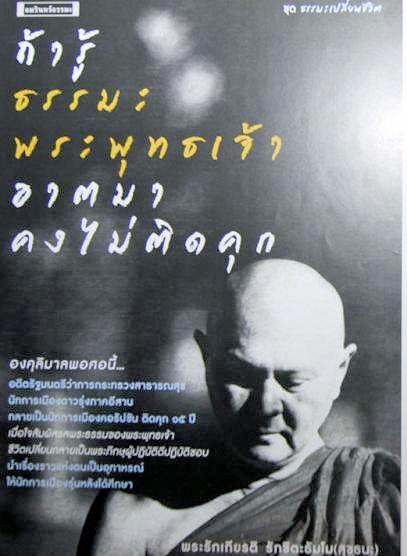
Abb.:
Einbandtitel von: พระรักเกียรติ รักขิตะธัมโม [Phra Rakkiat
Rakkhitadhammo] : ถ้ารู้ ธรรมะพระพุทธเจ้า อาตมา คงไม่ติดคุก [Wenn ich die Lehre
Buddhas gekannt hätte, wäre ich nicht ins Gefängnis gekommen]. --
กรุงเทพฯ : อมรินทร์, 2554 [=
2011]. -- 131 S. -- ISBN
9786165190763
2003-10

Inkrafttreten des Freihandelsabkommens zwischen Thailand und China. Das Abkommen führt u.d. dazu, dass China Thailand mit billigem Knoblauch überschwemmt und die einheimische jährliche Produktion, von der viele Kleinbauern abhängig sind, von 125.000 Tonnen (2002) auf 75.000 Tonnen (2007) fällt. Ähnlich negative Einwirkungen erfahren die Anbauer von Roten Zwiebeln, sowie die königlichen Bergvölker-Projekte, die Früchte und Gemüse gemäßigter Zonen (Äpfel usw.) anbauen.
Abb.: Erfährt durch Importe aus China einen drastischen Einbruch: Knoblauch-Trocknung. Lisu (ลีสู่)-Dorf bei Pai (ปาย), Provinz Mae Hong Son (แม่ฮองสอน), 2009
[Bildquelle: Claudia Gold. -- http://www.flickr.com/photos/claudiagold/3751815224/. -- Zugriff am 2012-02-23. -- Creative Commons Lizenz (Namensnennung, keine kommerzielle Nutzung, share alike)]
Abb.: Lage von Pai (ปาย)
[Bildquelle: OpenStreetMap. -- Creative Commons Lizenz (Namensnennung, share alike)]
2003-10

Eröffnung eines Container-Hafens am Mekong (แม่น้ำโขง / ແມ່ນ້ຳຂອງ / 澜沧江) in Chiang Saen (เชียงแสน). Er dient vor allem chinesischen Schiffen.
Abb.: Lage von Chiang Saen (เชียงแสน)
[Bildquelle: OpenStreetMap. -- Creative Commons Lizenz (Namensnennung, share alike)]
Abb.: Verlauf des Mekong
[Bildquelle: Michiel1972 / Wikipedia. -- GNU FDLicense]
2003-10
Kulturminister Anurak Jureemas (อนุรักษ์ จุรีมาศ, 1960 - ) hat Grund zur Besorgnis: bei einer Modeschau zeigte das Model Methinee Kingpayome (เมทินี กิ่งโพยม, 1972 - ) ihre Brustwarze. Der Kulturminister: "Es war - kulturell gesehen - nicht richtig."
Abb.: Methinee Kingpayome (เมทินี กิ่งโพยม) mit bedeckter Brustwarze
[Bildquelle: Sry85 / Wikipedia. -- GNU FDLicense]
Abb.: Kulturminister Anurak Jureemas (อนุรักษ์ จุรีมาศ)
[Bildquelle: th. Wikipedia. -- Fair use]
2003-10-01 - 2004-09-30
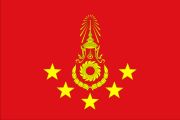
General Chaiyasit Shinawatra (พลเอก ชัยสิทธิ์ ชินวัตร, 1945 - ) ist Commander-in-Chief of the Royal Thai Army (ผู้บัญชาการทหารบก).
Abb.: Chaiyasit Shinawatra (พลเอก ชัยสิทธิ์ ชินวัตร)
[Bildquelle: th.Wikipedia. -- Fair use]
2003-10-03
Premiere des Films แฟนฉัน (My girl) der sechs Filmemacher
- Vitcha Gojiew (วิชชพัชร์ โกจิ๋ว, 1977 - )
- Songyos Sugmakanan (ทรงยศ สุขมากอนันต์, 1973 - )
- Nithiwat Tharathorn (นิธิวัฒน์ ธราธร, 1974 - )
- Witthaya Thongyooyong (วิทยา ทองอยู่ยง, 1973 - )
- Atisorn Trisirikasem (อดิสรณ์ ตรีสิริเกษม, 1975 - )
- Komgrit Triwimol (คมกฤษ ตรีวิมล, 1973 - )
Abb.: Filmplakat
[Bildquelle: Wikipedia. -- Fair use]
"Fan Chan (Thai: แฟนฉัน, English: My Girl) is a 2003 Thai romantic film offering a nostalgic look back at the childhood friendship of a boy and girl growing up in a small town in Thailand in the 1980s. It was the debut film by six young screenwriter-directors, Vitcha Gojiew, Songyos Sugmakanan, Nithiwat Tharathorn, Witthaya Thongyooyong, Atisorn Trisirikasem and Komgrit Triwimol. With a soundtrack that featured Thai pop music of the era, Fan Chan was the top domestic film at the Thailand box office in 2003, earning 140 million baht. Plot
Jeab (เจี๊ยบ), a young man working in Bangkok, receives word that his best friend from childhood, Noi-Naa (น้อยหน่า) is to be married. While driving back to his hometown, the memories of his friendship with her come flooding back, and their story is told in a flashback.
Jeab and Noi-Naa live in a small city in Thailand. Their fathers are rival barbers, with shops situated next to each other, with only a sweet shop to separate them. Jeab's father favors efficiency and uses an electric trimmer. Noi-Naa's father, meanwhile, has a more contemplative, artistic approach, and uses scissors. Jeab notes that the results of both methods seem to be the same.
The school holiday is ended. Jeab is notorious for oversleeping, so that each day he misses the school bus and must be driven part way by his father on a motorcycle. By taking a shortcut, Jeab and his father are able to catch up to the bus, but only just in time.
On the bus, other boys are introduced. Their ringleader is an overweight bully named Jack (แจ๊ค). On the bus, the children talk about what they are going to do after school. The boys decide they will play Chinese fantasy characters, while the girls plan to play "house".
Because Jeab must cross a busy street to play with the boys, and he fears getting hit by a car, he stays to play with the girls, which makes him the target of much taunting by Jack and the other boys.
Then, one day, Jack and his friends are playing soccer against a rival neighborhood gang. They are one player short. Jeab happens to be hanging around, and he's asked to join the game, proving his abilities.
He earns the trust of Jack's gang, and passes various tests in order to join. But the one thing he must do is sever his ties to Noi-Naa. Jeab does so, quite literally, by cutting a rubber-band jump rope, which Noi-Naa is skilled at playing with.
From that moment on, Noi-Naa refuses to talk to Jeab. Then, one day, Jeab gets word that Noi-Naa is moving away. And, of course, on the day she is to leave, Jeab oversleeps and misses the chance to say his final goodbye to Noi-Naa. Jeab then gets Jack and his friends to commandeer a delivery motorcycle and pursue Noi-Naa and her family in their moving truck. But the motorcycle breaks down, and the truck rolls out of sight. Jeab is to never see Noi-Naa again ... until her wedding."
[Quelle: http://en.wikipedia.org/wiki/Fan_Chan. -- Zugriff am 2014-10-09]
2003-10-03
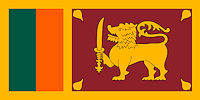
Es erscheint
Wassayos Ngamkhan: In the market for a firearm?. -- In: Bangkok Post. -- 2003-10-03
"Thai gun shops were buying firearms import permits from police officers for $25 each and then sold them on to an air force officer who imported the weapons and sold them on to the LTTE [Liberation Tigers of Tamil Eelam / தமிழீழ விடுதலைப் புலிகள்]. This led the Police Crime Suppression Division to conclude that legal gun stores formed the core of the illegal arms trade in Thailand." [Quelle: An atlas of trafficking in Southeast Asia : the illegal trade in arms, drugs, people, counterfeit goods and natural resources in mainland Southeast Asia / ed. by Pierre-Arnaud Chouvy [1971 - ]. -- London : Tauris, 2012. -- 214 S. : Ill. ; 26 cm. -- ISBN 978-1-84885-815-2. -- S. 191, Anm. 14]
2003-10-07
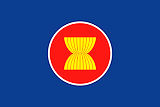
Die Staatschefs der ASEAN beschließen auf dem Gipfeltreffen in Denpasar (Bali, Indonesien), bis 2020 eine Wirtschaftsgemeinschaft nach europäischem Vorbild zu bilden.
Abb.: Lage von Denpasar (Bali, Indonesien)
[Bildquelle: OpenStreetMap. -- Creative Commons Lizenz (Namensnennung, share alike)]
2003-10-09
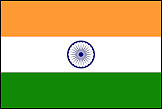
Thailand und Indien schließen ein Freihandelsabkommen, das 2010 vollumfänglich gültig wird.
Abb.: Indien
[Bildquelle: OpenStreetMap. -- Creative Commons Lizenz (Namensnennung, share alike)]
2003-10-10
In einer gemeinsamen Operation von Armee und Volunteer Defence Corps (Or Sor) (อส. = กองอาสารักษาดินแดน) werden südlich von Mae Sot (แม่สอด), Provinz Tak (ตาก), 9.340.000 ya ba-Tabletten (ยาบ้า; Amphetamine) beschlagnahmt. Es ist der bisher größte Drogenfund.
Abb.: Yaba (ยาบ้า)
[Bildquelle: DEA. -- Public domain]
Abb.: Lage von Mae Sot (แม่สอด)
[Bildquelle: OpenStreetMap. -- Creative Commons Lizenz (Namensnennung, share alike)]
2003-10-12
Der Zoo von Chiang Mai (สวนสัตว์เชียงใหม่) erhält als Leihgabe von China zwei Große Pandas (Ailuropoda melanoleuca) (แพนด้ายักษ์).
Abb.: Lage des Zoos von Chiang Mai (สวนสัตว์เชียงใหม่)
[Bildquelle: OpenStreetMap. -- Creative Commons Lizenz (Namensnennung, share alike)]
Abb.: Großer Panda (Ailuropoda melanoleuca) (แพนด้ายักษ์), Zoo Chiang Mai (สวนสัตว์เชียงใหม่), 2008
[Bildquelle: ernie .ca. -- http://www.flickr.com/photos/inanimate/2530576949/. -- Zugriff am 2012-01-01. -- Creative Commons Lizenz (Namensnennung, keine kommerzielle Nutzung)]
2003-10-14
Feierlichkeiten zum 30. Jahrestag der Studentenrevolution 1973. Die Feierlichkeiten werden von der Regierung mit über US$ 1,5 Mio. subventioniert.
2003-10-15
1500 bis 2000 Polizisten und Volunteer Defence Corps (Or Sor) (อส. = กองอาสารักษาดินแดน) gehen gegen Demonstranten vor, die eine Plantage in der Provinz Krabi besetzt haben. Es werden neben Tränengas auch M-16-Gewehre eingesetzt.
Abb.: Lage der Provinz Krabi (กระบี่)
[Bildquelle: OpenStreetMap. -- Creative Commons Lizenz (Namensnennung, share alike)]
Abb.: M-16-Gewehre
[Bildquelle: Offspring 18 87 / Wikipedia. -- GNU FDLicense]
2003-10-20

Das APEC-Gipfeltreffen wird in Bangkok mit einer großen Königlichen Barkenprozession (กระบวนพยุหยาตราชลมารค) eröffnet. Anlässlich des Gipfeltreffens besucht US-Präsident George W. Bush das Hauptquartier der Thai-Armee. Um einen guten Eindruck zu machen, waren vor dem Gipfeltreffen aus Bangkok Bettler und streunende Hunde entfernt worden.
Abb.: Königliche Barken-Prozession (กระบวนพยุหยาตราชลมารค), 2003-10-20
[Bildquelle: Presidential Press and Information Office. -- http://archive.kremlin.ru/eng/events/photos/2003/10/19_163873.shtml. -- Zugriff am 2012-01-01. -- Creative Commons Lizenz (Namensnennung)]
Abb.: Der russische Präsident Wladimir Putin (Владимир Владимирович Путин) mit Ministerpräsident Thaksin (ทักษิณ ชินวัตร) vor Beginn des APEC-Gipfels, 2003-10-20
[Bildquelle: Dmitry Astakhov. -- http://archive.kremlin.ru/eng/events/photos/2003/10/19_163873.shtml. -- Zugriff am 2012-01-01. -- Creative Commons Lizenz (Namensnennung)]
2003-10-21 - 2003-10-24
Als erster Teilnehmer aus einem nicht englischsprachigen Land gewinnt Panupol Sujjayakorn (1984 - ) in Kuala Lumpur (Malaysia) das World Scrabble Championship. Zweiter wird Pakorn Nemitrmansuk, ebenfalls aus Thailand.
Abb.: Panupol Sujjayakorn, 2005
[Bildquelle: Ann Sanfedele / Wikipedia. -- Creative Commons Lizenz (Namensnennung, share alike)]
2003-10-28
In Nonthaburi (นนทบุรี) konfiszieren die Behörden fünf Tiger, vier Bären, Gibbons und Wildschweine, sowie 20 Bärenpratzen und Teile eines Tigers. Die Tiere wurden gehalten, um sie für Fleischgerichte an Restaurants zu verkaufen.
Abb.: Lage von Nonthaburi (นนทบุรี)
[Bildquelle: OpenStreetMap. -- Creative Commons Lizenz (Namensnennung, share alike)]
2003-10-28

Abb.: Überschwemmungen in Südthailand 2003-10-28
[Bildquelle: G. R. Brakenridge ; Elaine Anderson ; Sébastien Caquard. --
http://www.dartmouth.edu/~floods/2003257.html. -- Zugriff am 2012-10-24. --
Creative
Commons Lizenz (Namensnennnung)]
2003-10-31 - 2009-04-03

Dato' Seri Abdullah bin Haji Ahmad Badawi (1939 - ) ist Ministerpräsident Malaysias. Er löst Mahathir bin Mohamad (1925 -) ab, der seit 1981 im Amt war.
Abb.: Malaysia
[Bildquelle: CIA. -- Public domain]
Abb.: Abdullah Ahmad Badawi mit Gattin, 2008
[Bildquelle: Looknarm / Wikimedia. -- GNU FDLicense]
2003-11-01
Premiere des Films The Adventure of Iron Pussy (หัวใจทรนง) von Apichatpong Weerasethakul (อภิชาติพงศ์ วีระเศรษฐกุล, 1970 - ) und Michael Shaowanasa (ไมเคิล เชาวนาศัย, 1964 - ).

Abb.: Plakat
[Bildquelle: Wikipedia. -- Fair use]
|
"The Adventure of Iron Pussy (Thai: หัวใจทรนง or Hua jai tor ra nong) is a 2003 Thai musical-action-comedy film written and directed by Apichatpong Weerasethakul (อภิชาติพงศ์ วีระเศรษฐกุล, 1970 - ) and Michael Shaowanasai (ไมเคิล เชาวนาศัย, 1964 - ) and starring Shaowanasai as the main protagonist – a transvestite Thai secret agent whose alter ego is a gay male 7-Eleven clerk. A homage and parody of the 1970s Thai action films, musicals and melodramas, particularly those that starred Mitr Chaibancha (มิตร ชัยบัญชา, 1934 - 1970) and Petchara Chaowarat (เพชรา เชาวราษฎร์, 1943 - ), the movie premiered at the 2003 Tokyo International Film Festival (東京国際映画祭) and has also played at the Berlin Film Festival, the International Film Festival Rotterdam and other festivals. It is a cult film and has screened at several gay and lesbian film festivals as well. PlotThe scene opens on a rural Thai coffee shop, run by an elderly man and his attractive teenage daughter. A gang of local toughs come in and start roughing up the customers and get abusive with the daughter. Suddenly, an elaborately coifed and tastefully dressed woman shows up and rescues the young woman and her father from further harm. This is Iron Pussy. She disappears into the bushes and re-emerges as a slight, shaven-headed man, who then gets on the back of a motorcycle taxi and heads into Bangkok. Along the way, the motorcycle driver, Pew, relates his memories of the day he and Iron Pussy met – Pew, crazed from a drug overdose, had taken a young woman hostage. Iron Pussy came on the scene and rescued not the young woman, but Pew, and the two have been a couple ever since. Iron Pussy arrives at her job. She is a clerk in a 7-Eleven in Bangkok. Unfailingly courteous and professional, she greets a man who she believes is just another customer, in the shop to pay his phone bill. When Iron Pussy scans the bill, a message comes up on the computer screen: "Hello Iron Pussy". It is a secret message from the prime minister. It seems there's a job for Iron Pussy. Once again in the guise of the superheroine secret agent, the demure Iron Pussy goes to the meeting place with the prime minister, a Buddhist temple, where she takes time to make merit by releasing some turtles and fish into the nearby river. She meets with Prime Minister Thaksin Shinawatra (ทักษิณ ชินวัตร, 1949 - ) and his cabinet (all lookalike actors), who take time to sing a song, extolling the virtues of Iron Pussy. Iron Pussy is tasked with uncovering the nefarious activities of Mr. Henry, a foreigner who frequently visits Thailand and leaves with full bank accounts. Mr. Henry will be attending a lavish party at the luxurious mansion of Madame Pompadoy, so Iron Pussy must infiltrate the housekeeping staff as a maid. Her charms win over Madame Pompadoy's debonair son, Tang, who is nonetheless in another relationship, being engaged to marry Rungraree, globetrotting socialite. Iron Pussy feels herself falling for Tang's charms as well, but she has a nagging feeling that something is not right about that relationship. Donning an all-black Spandex outfit and mask one night, Iron Pussy uncovers Mr. Henry's plot – he's making a mind-control drug. And Tang is involved in the scheme, which breaks Iron Pussy's heart. Later, at the big party being thrown by Madame Pompadoy, Iron Pussy steps up when the main entertainment doesn't show up, and sings a song that really impresses everyone. The next day, the family is going into the jungle for its annual deer hunt. This is when everything comes out – that Iron Pussy is actually a secret agent, but it's also revealed that Madame Pompadoy is Iron Pussy's mother, who gave Iron Pussy up for adoption long ago, which means, of course, that Tang is Iron Pussy's brother. Cast
[Quelle: http://en.wikipedia.org/wiki/The_Adventure_of_Iron_Pussy. -- Zugriff am 2013-03-20] |
2003-11-03

Pattaya (พัทยา): Tod von Maxine North (1920 - 2003). Frau North war 195 als Ehefrau des CIA-Agenten Robert G. North (gest. 1954) nach Thailand gekommen. Robert G. North leitete die Filmverleihgesellschaft Far East Film Co., eine Tarnorganisation des CIA. Das Ehepaar gründet die Firma North Star Co., welche das Trinkwasser Polaris for allem für das US-Militär in Südostasien produzierte. Polaris wurde zum Inbegriff von Trinkwasser in Flaschen, sodass Nam Polaris (น้ำโพลาริส) der Thai Ausdruck für abgefülltes Trinkwasser wurde. Nach dem frühen Tod (1954) ihres Ehemanns führte Frau North das Unternehmen und gründete außerdem 1960 Thai Celadon Company und 1967 Nipa Lodge in Pattaya.
2003-11-14
Premiere des Films Buppah Rahtree (บุปผาราตรี) von Yuthlert Sippapak (ยุทธเลิศ สิปปภาค, 1966 - )
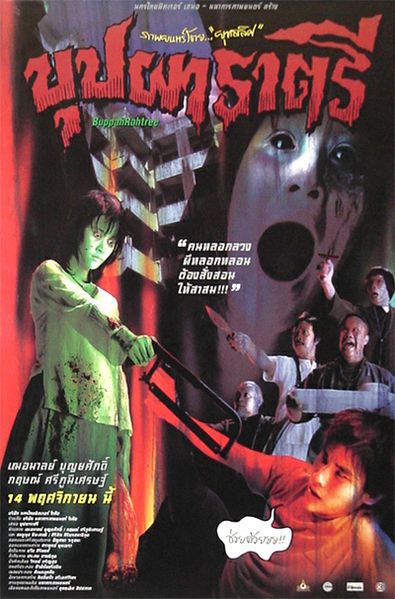
Abb.: Plakat
[Bildquelle: Wikipedia. -- Fair use]
|
"Buppah Rahtree (Thai: บุปผาราตรี also Rahtree: Flower of the Night and Buppah Rahtree: Scent of the Night Flower) is a 2003 Thai comedy-horror film written and directed by Yuthlert Sippapak (ยุทธเลิศ สิปปภาค, 1966 - ). With its comic references to The Exorcist (1973) and Audition (オーディション, 1999), Buppah Rahtree gained a cult following through screenings at the 2004 Toronto International Film Festival[1] and the Fantasia Festival.[2] Its sequels are Buppah Rahtree Phase 2: Rahtree Returns (บุปผาราตรี เฟส 2, 2005), Rahtree Reborn (Buppha Rahtree 3.1 - บุปผาราตรี 3.1) (2009) and Rahtree Revenge (Buppha Rahtree 3.2) (2009). PlotBuppah Rahtree (บุปผาราตรี) is a loner female student at a Bangkok university who becomes the object of a wager by a group of male students to see if she can be bedded. Ake (เอก), the son of a wealthy family, takes the bet and courts young Buppah. She resists him at first, but one day sees him feeding pigeons in a park and goes to talk to him. She remarks that in her next life she hopes to become a bird, so she could fly away. Noting his BMW convertible parked nearby, she goes on to say that if she had a way, she would fly away right now. So Ake takes Buppah for a ride down the highway. They continue to have a relationship, which culminates in a three-day weekend at Bang Saen (บางแสน), during which Ake has sex with her and stays in bed with her the whole time. Ake had videotaped their sessions and upon his return to Bangkok, he shows the tape to his friends. He has succeeded where the others failed and for his efforts, he wins a bottle of Johnnie Walker, which he reflects to himself seems like a trivial prize for messing up another person's life. Ake then breaks off all contact with Buppah, who finds she cannot reach him by phone. One day she is given a ride in a car by her stepfather, who takes Buppah to a short-time hotel and sexually assaults her. She stabs her stepfather with her fountain pen, that was given to her by her stepfather as a present and runs home to her apartment, room 609. Depressed, she decides to commit suicide and is about to cut her wrist with a utility knife when the phone rings. It is Ake and he wants to meet her. Ake informs Buppah about the wager with his friends and apologizes. He then informs her that he is to leave Thailand to study in England, but he hopes he and she can still be friends. Buppah then informs Ake that she is two months' pregnant. Ake is directed by his mother to convince Buppah to have an abortion. He brings her back to her apartment after the operation, and she is in obvious pain. He says he is going to get her some rice congee, but he instead gets in his car and drives away and then leaves the next day for England. Buppah is living an apartment block managed by Mrs. See (เจ๊สี่). One day Mrs. See tries to collect rent money from Buppah, who answers the door and looks weak, but says she'll pay the rent the next day. The next day passes and the landlady goes to investigate. She finds Buppah's door locked and chained. Using a hacksaw, Mrs. See's brother gains entry to apartment 609, and he discovers Buppah's corpse in the bathroom. Buppah has bled to death due to complications from the abortion. The police come, along with a spiky-haired female medical examiner, and the rescue squad, to retrieve the body. However, when the rescuers try to carry Buppah's body out, she starts moving. They put the corpse on the bed, and she sits up, scaring the rescue men, who run screaming from the room. The police are then sent in to retrieve the body, but they, too, are rebuffed. Buppah's vengeful spirit refuses to be dislodged. The apartment block is home to a false shaman named Maew (แมว), who puts on a daily act and earns quite a bit of money for Mrs. See. To make people believe he is real, Mrs. See convinces Maew to try to exorcise the ghost. After he fails, he convinces his teacher, Master Tong, to try. For his effort, Master Tong is left with a knife in his back. Then, a pair of Roman Catholic priests try to perform an exorcism, but only end up having obscenities shouted at them by the ghost, who also vomits a liquid akin to pea soup on one of the priests. Buppah's ghost runs wild throughout the apartment block. One night, she haunts every bathroom in every room. Her death by bleeding is re-enacted, with black blood flooding the hallway. Residents leave in droves, ruining Mrs. See's finances. Meanwhile, Ake has grown homesick in England, and has turned to drug use. He wants to come home. He then appears at Buppah's door, and offers to bring her some rice congee. Ake catches the eye of Muay (หมวย), a young woman at the congee stand. Muay seduces Ake, and has him take her to an old movie theater, where they have sex. When Ake returns to Buppah's apartment, he has forgotten the congee. Buppah knows that Ake has cheated on her, and for his transgression, she amputates his legs with the hacksaw that had been left behind by Mrs. See's brother. Muay later comes to the apartment to find Ake. Buppah takes possession of Muay's body and starts to have Muay cut her own legs off with the hacksaw. Mrs. See still wants to get Buppah out of her building, so she has summoned a genuine shaman from Cambodia. The shaman and his men come to the apartment just as Muay is being possessed. They put a spirit cloth over Ake and on Buppah's corpse. Through a prayer, the shaman is able to get Buppah's spirit back into the corpse. They then plan to take Buppah to a temple to be cremated, but on the way, the spirit cloth blows off the body, which is in the back of a pickup truck. Buppah takes control of the vehicle and causes it to crash into another truck. Muay, saddened by the turn of events, makes contact with Ake's father, who is angered and puzzled by the call. As it turns out, Ake has been dead for more than a month. Muay had sexual relations with Ake's ghost. Buppah is back in apartment 609, where she will likely stay for eternity. Ake's ghost, now legless, sits outside in the hallway, and apologizes to Buppah for the rest of his ghost eternity. Cast
[Quelle: http://en.wikipedia.org/wiki/Buppah_Rahtree. -- Zugriff am 2013-03-20] |
2003-11-19

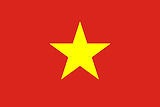
Erstmals seit dem Vietnamkrieg läuft ein US-Kriegsschiff in Vietnam ein. Die Fregatte USS Vandegrift (FFG 48) ist für vier Tage auf Freundschaftsbesuch in Ho-Chi-Minh-Stadt.
Abb.: Lage von Ho Chi Minh City
[Bildquelle: OpenStreetMap. -- Creative Commons Lizenz (Namensnennung, share alike)]
Abb.: Landung von USS-Vandegrift in Ho-Chi-Minh-Stadt, 2003-11-19
[Bildquelle: U.S. Navy photo by Photographer's Mate 3rd Class Gary B. Granger / Wikimedia. -- Public domain]
2003-11-24
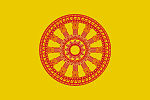
Tod von Luang Phu Kamphan Kosapanyo (หลวงปู่คำพันธ์ โฆษปัญโญ, geb. 1915), Wat Phrathat Maha Chai (วัดพระธาตุมหาชัย), Nakhon Phanom (นครพนม). Obwohl ihm regierungsseits abgeraten worden war (da es Futter für kommunistische Propaganda sein könnte) baute er um 1970 im damals bettelarmen Isaan einen protzigen Tempel.
Abb.: Luang Phu Kamphan Kosapanyo (หลวงปู่คำพันธ์ โฆษปัญโญ)
Abb.: Wat Phrathat Maha Chai (วัดพระธาตุมหาชัย), Nakhon Phanom (นครพนม)
[Bildquelle: http://region2.prd.go.th/ewt_news.php?nid=5279&filename=index. -- Zugriff am 2012-06-29. -- Fair use]
2003-11-27
In Amphoe Thepha (เทพา), Provinz Songkhla (สงขลา), wird ein Quartier des Volunteer Defence Corps (Or Sor) (อส. = กองอาสารักษาดินแดน) angegriffen. Wochen später werden sechs Mitglieder des Or Sor dieses Quartiers verhaftet und des Angriffs angeklagt. 2004-03 wird die Anklage fallen gelassen.
Abb.: Lage von Amphoe Thepha (เทพา)
[Bildquelle: OpenStreetMap. -- Creative Commons Lizenz (Namensnennung, share alike)]
2003-11-28
Premiere des Films Beautiful Boxer (บิวตี้ฟูล บ๊อกเซอร์) von Ekachai Uekrongtham (เอกชัย เอื้อครองธรรม/吕翼谋)

Abb.: Plakat
[Bildquelle: Wikipedia. -- Fair use]
|
Der Spielfilm Beautiful Boxer (Thai: บิวตี้ฟูล บ๊อกเซอร์) von Ekachai Uekrongtham (เอกชัย เอื้อครองธรรม/吕翼谋) handelt von der wahren Lebensgeschichte der Parinya Charoenphol[1] (ปริญญา เจริญผล aka Nong Thoom - น้องตุ้ม, 1981 - ) einer Thai-Boxerin, die sich einer geschlechtsanpassenden Operation unterzog, um auch körperlich eine Frau zu werden. Der Film zeigt alle wichtigen Stationen ihres Lebens vom Leben in der Rolle eines Jungen, der gerne Lippenstift getragen hatte, über den Start als Kick-Boxer im Alter von 12 Jahren bis zur sensationellen Karriere als Thai-Boxer durch die Beherrschung des traditionellen Muaythai-Stils (มวยไทย). Sie hatte diesen Stil bis zur Perfektion erlernt und brachte es zu Ruhm und Bekanntheit. Schließlich wird der innere Geschlechtskonflikt, der dann zu der Operation und zum Rücktritt als Thai-Boxerin führt, dokumentiert. Der Film spiegelt auch die besondere Lage der Kathoeys (กะเทย, besser bekannt ist der englische Begriff Ladyboy) wider, die – anders als in westlichen Kulturen – schon seit langem akzeptiert und zum Teil in die Gesellschaft integriert sind. Besetzung:
[Quelle: http://de.wikipedia.org/wiki/Beautiful_Boxer. -- Zugriff am 2013-03-21] |
2003-12
Inbetriebnahme des Meeres-Kabelsystems TIS (Thailand-Indonesia-Singapore)
2003-12
Das Volunteer Defence Corps (Or Sor) (อส. = กองอาสารักษาดินแดน) erhält 14 modifizierte Humvee-Geländefahrzeuge für den Einsatz in Südthailand.
Abb.: Humvee beim Einsatz in Afghanistan
[Bildquelle: Cpl. James L. Yarboro, U.S. Marine Corps / Wikipedia. -- Public domain]
2003-12-03
Erster Flug von Thailands erstem Billigflieger One-Two-Go Airlines.
Abb.: ®Annonce
"One-Two-Go (วัน-ทู-โก แอร์ไลน์)war eine thailändische Billigfluggesellschaft mit Sitz in Bangkok und eine hundertprozentige Tochtergesellschaft der Orient Thai Airlines (โอเรียนท์ ไทย แอร์ไลน์). Geschichte
One-Two-Go nahm die Flugtätigkeit am 3. Dezember 2003 auf. Die erste Strecke war Bangkok - Chiang Mai (เชียงใหม่), wo die Muttergesellschaft Orient Thai Airlines ihren Heimatflughafen hat. Zuletzt bot sie wöchentlich 168 Flüge zu unterschiedlichen Destinationen an und beschäftigte knapp 650 Mitarbeiter. Mittelfristig sollten bis zu zehn MD-82 zum Einsatz kommen. Mitte Mai 2007 wurde bekannt, dass One-two-Go 14 MD-81 aus Beständen der Japan Airlines übernehmen wird und international expandieren möchte.
Ab dem 22. Juli 2008 wurde der Flugbetrieb bis zum 15. September 2008 eingestellt, wie die Fluggesellschaft auf ihrer Website mitteilt. Im Wesentlichen wird der erhöhte Kostendruck als offizielle Begründung angeführt. Anderen Berichten zufolge sei gegen die Fluggesellschaft ein Flugverbot wegen eines Ermittlungsverfahrens erteilt worden. Es bestehe der Verdacht auf Missachtung von Sicherheitsvorschriften. Anfang 2009 wurde der Flugbetrieb auf den Strecken Bangkok (Don Mueang) nach Chiang Mai, Chiang Rai (เชียงราย), Hat Yai (หาดใหญ่), Phuket (ภูเก็ต) und neuerdings nach Trang (ตรัง) wieder aufgenommen.
Im April 2009 wurde die Fluglinie in die schwarze Liste der Europäischen Union aufgenommen, dieses Verbot wurde am 14. Juli 2009 wieder aufgehoben.[5]
Seit die Flotte der One-Two-Go im Jahr 2010 an die Muttergesellschaft Orient Thai Airlines überstellt wurde, bedient diese die früheren Strecken der One-Two-Go in eigenem Namen."
[Quelle: http://de.wikipedia.org/wiki/One-Two-Go_Airlines. -- Zugriff am 2012-01-01]
2003-12-04

In der Rede anlässlich seines Geburtstags ermahnt der König Ministerpräsident Thaksin, über seine Erfolge nicht zu stolz zu werden.
2003-12-05
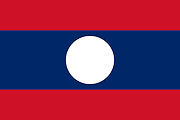
Die laotische Zeitung Vientiane Times bezeichnet König Bhumibol al "development monarch".
2003-12-09


Markteinführung der Musik-CD mit Werken von König Bhumibol
Tetvocal: A Portuguese Tribute to His Majesty the King of Thailand - Um Tributo Português a Sua Majestade o Rei da TailândiaKünstlerlink Tet Vocal auf Spotify:
URI: spotify:artist:2kKDc92NCLiqufqRgYl6cf
URL: https://open.spotify.com/artist/2kKDc92NCLiqufqRgYl6cf
Abb.: CD-Cover
2003-12-15
Mahouts, die ihre Elfanten in Bangkok's Straßen zum Betteln führen, müssen die Stadt innerhalb von 14 Tagen verlassen. 250 bettelnde Elefanten gibt es in Bangkok.
Abb.: Bettel-Elefant, Bangkok, 2008
Man "darf" den Elefanten mit Zuckerrohr für 20 Baht füttern
[Bildquelle: EJ Sabandal. -- http://www.flickr.com/photos/ejsabandal/2211388705/. -- Zugriff am 2012-01-01. -- Creative Commons Lizenz (Namensnennung, keine Bearbeitung)]
2003-12-20


Die Tourismus-Organisationen von Thailand, Laos und Kambodscha bilden die Tourismusregion "The Emerald Triangle". Diese Dreieck umfasst die Provinzen
- Laos
- Champasak (ຈໍາປາສັກ)
- Attapeau (ອັດຕະປື)
- Kambodscha
- Preah Vihear (ព្រះវិហារ)
- Stung Treng (ខេត្តស្ទឹងត្រែង)
- Thailand
- Ubon Ratchathani (อุบลราชธานี)
- Si Saket (ศรีสะเกษ)
Abb.: The Emerald Triangle
[Bildquelle: OpenStreetMap. -- Creative Commons Lizenz (Namensnennung, share alike)]
2003-12-20
Ministerpräsident Thaksin missbilligt, dass die Bangkoker Polizei einen neunjährigen Buben inhaftiert hat. Der Bub hatte gegen die Straßenverkehrsordnung verstoßen und war bei einem Zusammenstoß mit einem Taxi ernsthaft verletzt worden. Thaksin: "Es ist nicht recht, Kinder in diesem Alter in Gefängnisse zu stecken.´"
2003-12-20
In der Bangkok Post erscheint letztmals Bernard Trink's (1931 - ) Kolumne "Nite Owl".
"Bernard Trink (born 1931) is a former columnist for the Bangkok Post. A native New Yorker, Trink came to Bangkok in the mid 1960s and taught English at various universities before taking over the "Nite Owl" column in 1966 at the now defunct Bangkok World, Bangkok's evening English-language newspaper. Trink's popular "Nite Owl" column ran weekly for the next 37 years, covering Bangkok's night time entertainment (go-go bars, nightclubs, pubs and massage parlors). He also wrote restaurant reviews as Friar Tuck and did regular film and book reviews and interviews under his own name. History
Originally, Trink's "Nite Owl" was an informative three page illustrated section that appeared in the World every Friday afternoon. However, when that newspaper was bought out and shut down by the Bangkok Post in the mid 1980s, Trink's column was shortened to just one page and the photographs were eliminated. The Post also restricted what Trink could write about and his column became decidedly tamer. However, he continued to have his dedicated fans and when the Bangkok Post tried to stop his column in the late 1990s, a letter writing campaign persuaded the paper to change its mind. Nevertheless, the column was further reduced to just half of a page.
In December 2003, Trink's column was dropped without fanfare by a new editor, who decided it was time for Trink to go. There was no announcement that it was ending, nor any farewell party for the long time columnist. The "Nite Owl" column simply vanished. Trink still writes book reviews for the Post and for a time did his own web site, but he is now more or less retired.
Trink in his columns was often critical of the city's seamier, sleazier nightlife and always warned foreign men about becoming romantically involved with bar girls, whom he held in low regard. He also spoke out for women's rights and against child prostitution, but his belief that HIV did not lead to AIDS brought him considerable criticism and may have contributed to the demise of his column.
Trink is the subject of an unauthorized biography by Jennifer Bliss, called But I Don't Give a Hoot, published by Post Books in 2000."
[Quelle: http://en.wikipedia.org/wiki/Bernard_Trink. -- Zugriff am 2012-01-01]
2003-12-26
Premiere des Films OK Baytong (โอเค เบตง) von Nonzee Nimibutr (นนทรีย์ นิมิบุตร, 1962 - )
Abb.: Filmplakat
[Bildquelle: Wikipedia. -- Fair use]
"OK Baytong (Thai: โอเค เบตง) is a 2003 Thai drama film about Buddhist-Muslim relations in southern Thailand. It is written and directed by Nonzee Nimibutr (นนทรีย์ นิมิบุตร, 1962 - ). Plot
Tum (ธรรม) is a young man who has been a monk living in a Buddhist temple in Thailand since he was 5 years old. But after hearing that his sister has been killed in an attack on a train by insurgents, he decides to leave the monastery and make his way to southern Thailand where his sister ran a beauty salon in a town called Betong (เบตง) in a district in Yala (ยะลา) Province on the border with Malaysia.
In looking to put his sister's affairs in order, Tum finds himself conflicted. Should he take over his sister's business? His sister has a daughter, by a Muslim man who lives on the Malaysian side of the border. Should Tum try to take a greater role in the raising of the child?
But first, Tum must figure out how to zip up his trousers without hurting himself. It's only one of the many new things to the young man, who has worn a Buddhist monk's robes for most of his life. He also encounters romantic and sexual feelings when he develops a relationship with a neighbor lady, who was a friend of his sister.
And, Tum must reconcile the feelings of hate and rage that sometimes come into his head when he thinks about Muslim people and the insurgents who were responsible for his sister's death.
CastFilm festivals
- Phoovarit Phumpuang (ภูวฤทธิ์ พุ่มพวง) as Tum (ธรรม)
Jeeranan Manojam (จีรนันท์ มะโนแจ่ม, 1981 - ) as Lynn (หลิน)
- Saranya Kruengsai (สรัญญ่า เครื่องสาย)
OK Baytong was shown at many film festivals worldwide in 2004, including:
- Bangkok International Film Festival
- Berlin Film Festival
- Hawaii International Film Festival
- Hong Kong International Film Festival
- New York Asian Film Festival
- Pusan International Film Festival
- Seattle International Film Festival
- Vancouver International Film Festival"
[Quelle: http://en.wikipedia.org/wiki/OK_Baytong. -- Zugriff am 2012-06-09]
2003-12-27


Bei einem Selbstmordattentat auf das Thai-Militär-Camp in Karbala (كربلاء), Irak, fallen zwei thailändische Soldaten. Fünf Thai-Soldaten werden verletzt. Thailand hatte im Oktober 447 Militärs im Irak-Krieg.
ausführlich: http://www.payer.de/thailandchronik/ressourcen.htm
Zu Chronik 2004 / B. E. 2547. -- 1. undatiert